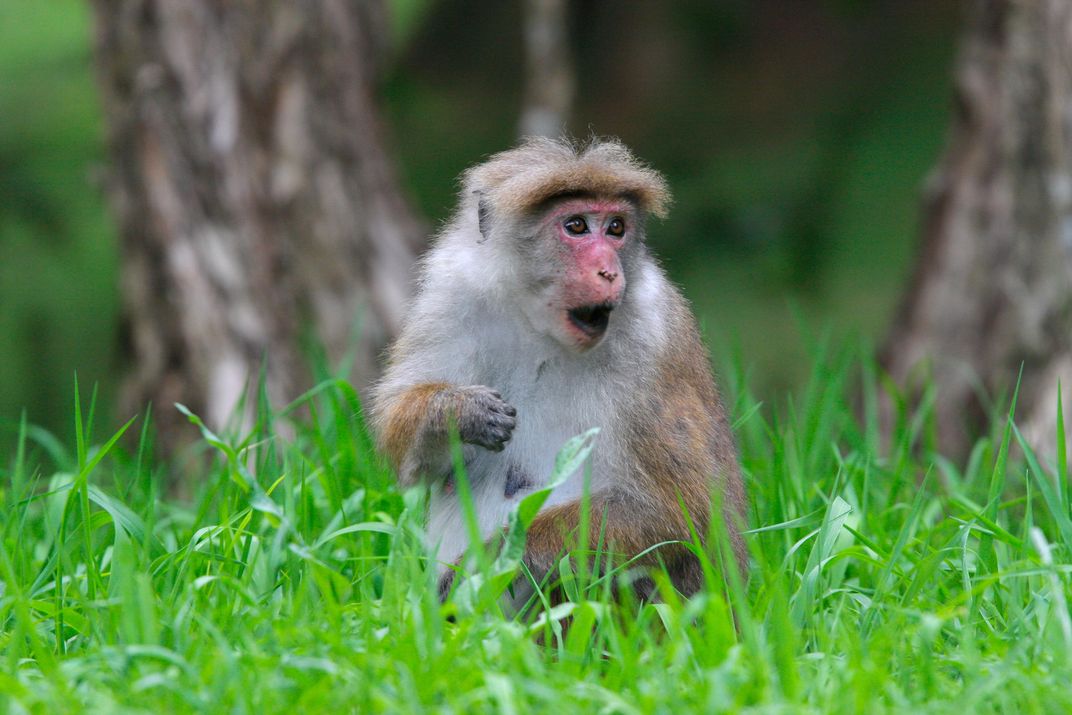Humans Relied on Rainforest Riches 12,000 Years Earlier Than Thought
Fossil remains suggest that prehistoric people in Sri Lanka may have eaten monkeys and other forest species
/https://tf-cmsv2-smithsonianmag-media.s3.amazonaws.com/filer/bd/2d/bd2d2bdc-3d00-46d8-b0aa-fedc052535f8/roberts1hr_copy.jpg)
Rainforests may not have stayed pristine for as long as scholars had assumed. Humans have been relying on the resources of tropical rainforests for at least 20,000 years—thousands of years longer than scientists had previously thought, according to a study published today in Science.
Tropical forests are beautiful places full of a rich diversity of plants and animals. They are also difficult to traverse and often lacking in food for a hungry human. There may be plenty of animals, but they may be small and well hidden in the trees. Fruit and plants may be numerous—but many are full of poison. Life on the plains thousands of years ago would probably have been a lot easier. Anthropologists and ecologists in the 1980s argued that those difficulties in navigation and obtaining food made rainforests undesirable for human occupation, notes study leader Patrick Roberts, a doctoral student at Oxford University. Before about 8,000 years ago, those arguments go, tropical forests were pristine and human-free.
Archaeological sites in Africa, Southeast Asia and Melanesia previously provided tantalizing evidence that humans have been using rainforest resources for at least 45,000 years. Those plant and animal remains, though, couldn’t show whether humans had wandered into rainforest for a brief period or were living there year after year.
In the new study, Roberts and colleagues analyzed teeth in the remains of 26 humans and dozens of animals found at three archaeological sites in Sri Lanka. Teeth provide important clues about an animal’s diet. Plants that grow in different places, such as the floor of a rainforest versus an open savanna, contain slightly different ratios of carbon and oxygen isotopes. Those differences get recorded in the teeth of the animals that eat the plants, so scientists can analyze teeth and determine where an individual got most of their food.
In the human remains from Sri Lanka, which date back about 20,000 to 3,000 years ago, all but two of the individuals had a tooth signature that matched a diet gathered from semi-open rainforests and forest edges. That meant humans were occupying rainforests at least 12,000 years earlier than scientists had thought.

Unfortunately, scientists cannot determine from the teeth exactly which species of animals and plants those prehistoric humans were eating, notes Roberts. “However, the associated animal remains at the Sri Lankan archaeological sites suggest large, almost unprecedented, numbers of monkeys in the human kill assemblages.” There were also giant squirrels, mouse deer, porcupine and snails, as well as evidence for the use of nuts and starchy plants.
Julio Mercader, a tropical archaeologist at the University of Calgary and a member of the Smithsonian’s Human Origins Program Team, said that he found the evidence of rainforest food consumption 20,000 years ago to be fascinating. “It confirms the great time depth that both human ecology and manipulation of Sri Lanka’s rainforests have. In addition, it speaks indirectly to the ability of modern humans to settle a huge variety of ecosystems as they colonize extreme environments throughout the Old World.”
Though humans may have been using rainforest resources for thousands of years, those forests were largely protected from widespread deforestation prior to 1700. Then, as the human population expanded and pushed into new areas, people began to increasingly cut down rainforest for its wood and other raw materials, and to clear space for farmland. That deforestation continues at a rapid pace today, with consequences for human health and the entire planet.
“If our ancestors were able to gain such crucial knowledge and respect for these ecologies throughout these long periods of time, then it is somewhat arrogant that we think we can now go and change them significantly without there being considerable consequences for animal or human populations living within them, or our species more widely,” says Roberts.
/https://tf-cmsv2-smithsonianmag-media.s3.amazonaws.com/accounts/headshot/Sarah-Zielinski-240.jpg)
/https://tf-cmsv2-smithsonianmag-media.s3.amazonaws.com/accounts/headshot/Sarah-Zielinski-240.jpg)